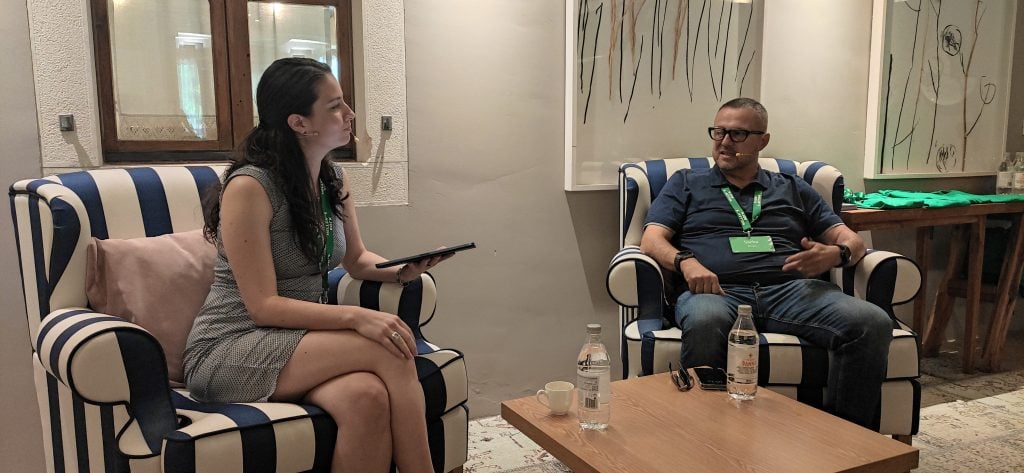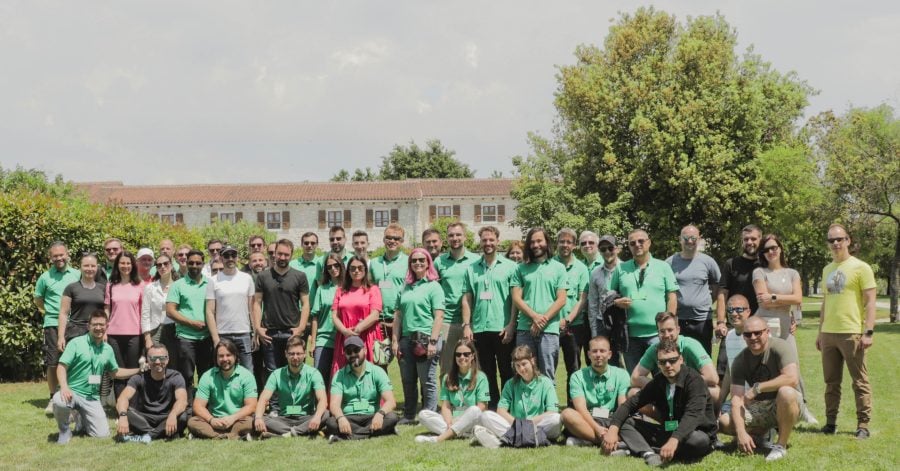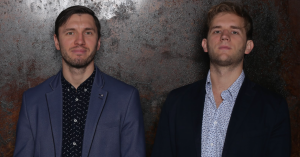Earlier this month, The Recursive’s founders, Irina Obushtarova and Etien Yovchev, had the privilege to attend Hellen’s Rock Capital‘s inaugural founder retreat in Meneghetti, Croatia. Held from June 1st to June 4th, this gathering was centered around the theme, “How Mindsets And Strategies Enable Founders To Build Great Companies.”
The event was attended by 55 prominent entrepreneurs, investors, and ecosystem builders from 12 countries. Hellen’s Rock invited portfolio founders, its team, partners such as Superbet Ventures, and special guests from around the world. The retreat’s format fostered insightful conversations and sharing of experiences through interactive sessions, fireside chats, and keynotes.
One such fireside chat, moderated by Irina, featured the insights of Sacha Dragic, the Founder of Superbet Group and Hellen’s Rock family office. In this piece, we will delve into Dragic’s journey and learnings as he scaled Superbet to a multi-billion dollar company that in 2019 attracted $175M from Blackstone Group, one of the world’s largest private equity firms.

From a 2-person family business to a billion dollar company
The Superbet story began in 2008, at the height of the last financial crisis. “Back then I would have estimated our chance of survival to be very low – 1-2%. It wasn’t before the end of 2010, I was sure we would survive,” Sacha shared.
The fledgling organization survived a 2-year period of high uncertainty and made crucial hires, including their first COO and CFO. These additions turned Superbet into a disciplined organization with an emphasis on building a strong business model and rigorous business plan execution. By 2015, the company became highly profitable with 10+ million in profits.
With industry digitalization and market changes, Dragic initiated several changes between 2016 and 2018, investing heavily in technology and making strategic acquisitions. To guide future growth decisions, he created an advisory board and, in 2016, enlisted an investment bank’s help for growth investment.
“I built an advisory board because I realized I didn’t have the right experience for the next steps in our growth. There were 6-7 people, we were meeting every 3 months for 2 days, discussing important topics for the company. Part of this advisory board was Gil White, an Israeli lawyer who advised us to take an investment bank to guide us in the process of finding a growth investment partner. If we hadn’t made that decision in 2016, the Blackstone deal wouldn’t have happened,” explained Sacha.
His strategic decision to build relationships with potential investors laid the foundation for Superbet’s landmark deal with Blackstone in 2019, a three-year-long process.
“We started meeting with potential investors in 2017. We went to the US and the UK, it was a no-ask trip, we didn’t pitch for any money. We just presented the company, our numbers, what our growth plans are and that in a year or two we might be looking for a partner.”
Today, Superbet counts 4500 team members in 10 countries and is preparing to grow further in the years to come.
The mindsets behind this success story
1. On starting life as an entrepreneur: “I was young, and I was trying to have three careers at the same time. Then, they changed the law and you were finally able to do import-export business as a private company. I felt like it was a huge opportunity and founded my first company when I was 22. In my family, no one was an entrepreneur before me – I just felt that I wanted to be different from the others in the family.”
2. On failure and working on the ego: “There are three big risks in the life of an entrepreneur, especially a younger one – the ego, the focus, and the right balance between being resilient and knowing when to pivot.
Sometimes your ego is so strong that it becomes your biggest enemy. You need to master your ego, and the best way to do it is through failures. You will fail even without trying and if you don’t fail it means you didn’t take enough risks.
If you are backing someone, you need to be aware that some people will succeed from the 1st attempt, some from the 2nd, some like me from the 8th. For me, the more times you fail, the bigger the success is likely to be later. Because you learn so many things. And because it trains your ego. If you have a big ego that’s not under control you will never be able to work with great people. At some point, you also lose your fear of failure – fear is never a good reason to do things anyway.
3. On building strong teams: “Sacha Dragic lives in the future. Then, he finds smart people and delegates the present to them. He gives them direction and lets them figure out how to get there. This creates an environment where people feel an incredible amount of ownership because they are 100% trusted to execute and solve problems,” Joe Bryan, VC at Superbet Ventures, described what it’s like to work with Sacha.
4. On having a beginner’s mindset and trusting others: “I think that my biggest advantage that helped me build Superbet into a really big company was that I wasn’t an expert in anything. I don’t really understand commercial, I don’t understand marketing, I never open Excel, I don’t know how to make a business plan, I don’t understand the technical details that much. When you know nothing, you need to rely on people, and to find people who know stuff and that you trust. When hiring for leadership positions, I always look for someone with a very strong opinion, who would disagree with me.”
5. On supporting the right type of people (and sharing success): “We are aware that the probability of success for a startup is very low for a number of factors. So, we are really looking into what’s the drive and the character of the entrepreneur. Because if we find the right person who we can trust, that person will sooner or later succeed. In my case, few people were backing me in these 20+ years of continuous failures (I had 7 big failures and 17 smaller ones in between before succeeding with Superbet). They supported me with small amounts of money when something went wrong. Now, each of them has between 5-10 million euro in Superbet shares.”
6. On focusing on revenue in the early stages: “Money should be a primary motivation at the beginning, then it should become secondary. But this is only when it becomes easily accessible and you don’t have survival risks. Then, you really need to focus on building stuff – product, monetization machines, organizational structures.”
7. On entrepreneurship as more than a money-making pursuit: “Actually, that’s when you see the real entrepreneurs – after they’ve made some money – do they keep building or take the 10-20 million euro check, sell the company and buy some real estate to enjoy passive income and days on the beach. Then you’ve been just lucky, not an entrepreneur.”
8. On splitting ways with team members who previously brought success: “There are many people in the Superbet history who were very important at a certain stage but then had to leave because otherwise the company wouldn’t have continued growing. You have to appreciate what they have given to the company and reward them but ultimately move on. If you want to build an outstanding company, you need to be ready to part ways with anyone, especially if they’re comfortable and don’t want to develop further. I even fired myself as a CEO in 2019, and as an Executive Chairman in 2023, my wife as well.”
9. On culture: “People think that when you are small your culture is better. It’s not better because you just don’t have the same level and quantity of capable people as in big organizations – as long as you are smart enough not to hire bureaucrats. If you are a big organization of smart people, then you build a much better culture than with a small company with a small amount of people – knowledge is limited no matter how talented they are. At the beginning your sole focus should be on survival, you usually wouldn’t have a nice culture unless you are in the Silicon Valley and can raise $100 million on a presentation.”
10. On the question of entrepreneurs giving back: Should entrepreneurs have a bigger role in giving back to society? Absolutely. But first they need to have their business survive and become successful entrepreneurs. It’s much more important to focus in the beginning on building a successful long-lasting business, than filling your head with all sorts of ideas for helping the community.
As I mentioned, the lack of focus is the second big risk for entrepreneurs – an entrepreneur is always tempted by side things. So, for me until the success becomes very strong and you are 100% sure that you have a team that can run your core business, you shouldn’t waste time on anything else. If you are really successful, you will be able to help way more later. Bill Gates started donating money when he was by far the richest person in the world.”
11. On creating a high-quality startup ecosystem: “I would very much like to see 30-40 unicorn companies from the region in the next few years. Because then each of these startups will build its own ecosystem and flywheel effect and it will solve new things. Quality is great. But quality always comes from quantity. Otherwise, it’s just luck. And you need a system to grow the quantity of startups and create the next generation of entrepreneurs. Quantity will almost automatically create quality. And with a system, you learn much faster from people around you.”
12. On what is missing for systemic success in the region: “It’s the mindset. Most successful people in the region have an end goal. After they achieve it they stop building – they take their money and invest it in real estate or put it in a bank and just try to have a nice life. But that way they take all the knowledge, mistakes, and resources they’ve generated out of the ecosystem.”
13. On solving the big problems in the world: “As you become more and more successful, you start thinking more about how you solve different issues. However, most things need resources in order to be solved. So, if you want to be a better solver at the end, you need to be a better builder at the beginning and build a significant base of resources and knowledge.
Otherwise, without those you won’t solve that much – you may feel good about yourself but you wouldn’t be having a great impact. That’s why in the next 5-6 years, I want to be more focused on building – making systems and a lot more money and then shift and focus on the solving part of things.”








